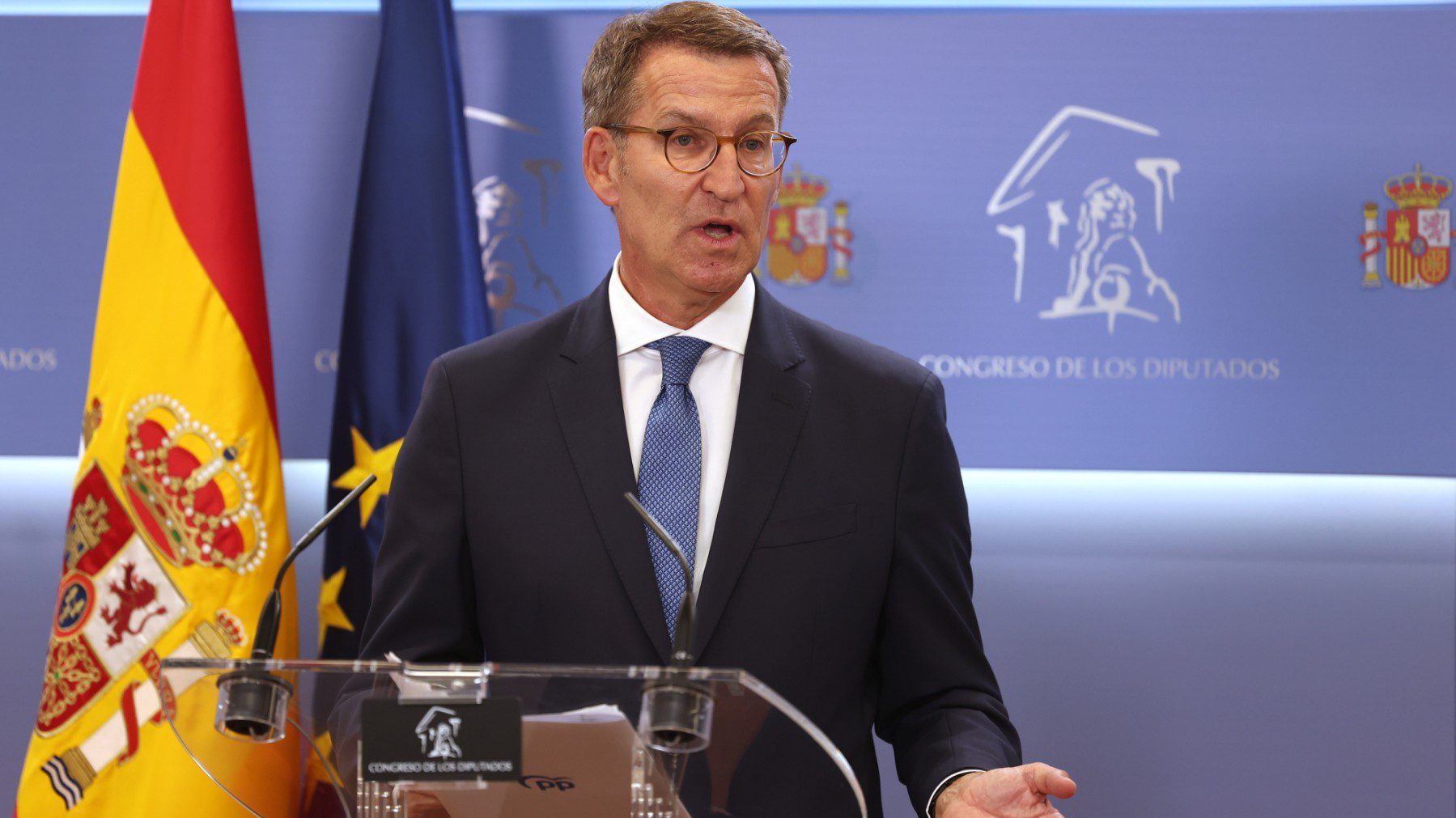
The candidate of conservative Partido Popular (PP) Alberto Nunez Feijóo gestures during a press conference after meeting with the king as part of the round of consultations with political representatives aiming at proposing a candidate for the investiture, at the Congress of Deputies in Madrid on August 22, 2023.
Photo: Pierre-Philippe MARCOU / AFP
The King of Spain, Felipe VI, has decided that the Right will get the first chance at breaking a possible stalemate and forming a new government for his kingdom.
Elections at the end of July resulted in a hung parliament for the Iberian country and a difficult decision for the head of state. Under Spain’s constitutional monarchy, proposing a candidate for president of the government (in effect, prime minister) to then be debated and voted on by the parliament belongs to the monarch.
The Partido Popular won the largest number of votes and notably more than the next winning party, the centre-left Partido Socialist Obrero Español (PSOE), but fell shy of a majority, even counting in the support of the conservative VOX. At the same time, despite its mediocre performance in the elections, the PSOE has every intention of forming another coalition government just like the one it held together for four years until the July elections.
In the last month, both main parties have been scraping together the support of smaller parties to the right and left, along with those of regional and separatist parties. Every vote counts, with the margin for investiture still razor-thin.
Following meetings with each of the parties in parliament to understand which candidate has the most support, Felipe VI announced late Monday, August 22nd, that he was putting PP president Alberto Nuñez Feijóo forward as presidential candidate.
Feijóo appears to have 172 votes in favour, specifically 137 from his own party, 33 from Vox, one from Union del Pueblo Navarra, and the other from the Canary Coalition. It’s still not enough to gain control of the government. The only hope is that the less radical Basque nationalist party, PNV, would in the end throw its support behind Feijóo, but the chances are slim.
Feijóo knows he is likely facing a failed investiture. He said in a press conference following his meeting with the king that he told the monarch he was willing to try “to fulfil my duty” and give “a voice” to the more than 11 million Spaniards who had voted for him and his supporting parties.
“Leaving this desire to turn the page orphaned would be irresponsible,” he added.
He also said that despite the unlikelihood of him actually forming a government, “I will be a candidate who meets two conditions: the one who has won the elections and the one who will defend the equality of all Spaniards.”
He publicly thanked VOX leader Santiago Abascal for his support for a PP solo government, mentioning also the other parties willing to back him. He revealed that he had spoken with the VOX leader shortly before his meeting with the king to solve the parties’ “disagreements and misunderstandings.”
In a post on X (formerly Twitter) a few hours later, Abascal said the two parties had begun a “new stage of collaboration.”
“I hope that, from now on, the enemies of governmental agreements between PP and Vox will refrain from jeopardising the construction of the alternative. Now a new stage of collaboration opens between two very different political formations, very distant, but capable of respecting and agreeing when necessary,” he added.
VOX seems to have agreed not to hold any positions within a potential PP-led government, allowing the centre-right to govern alone.
Following his own meeting with the king, which occurred before Feijóo’s, Abascal announced that he had communicated to the monarch that his party was willing to support Feijóo’s investiture under four conditions: that the PP not collaborate with the “undemocratic cordon sanitaire” around VOX, that it “publicly acknowledge the value of the political agreements between the two parties in regional and municipal governments,” recover the neutrality of public institutions, and a “promise to end the stigmatisation of VOX voters.”
The date for a vote on Feijóo’s investiture has yet to be set, but it may not occur until September.
Even if Feijóo loses, a more politically fruitful stance between the PP and VOX at the national level would be a positive outcome of the effort.
